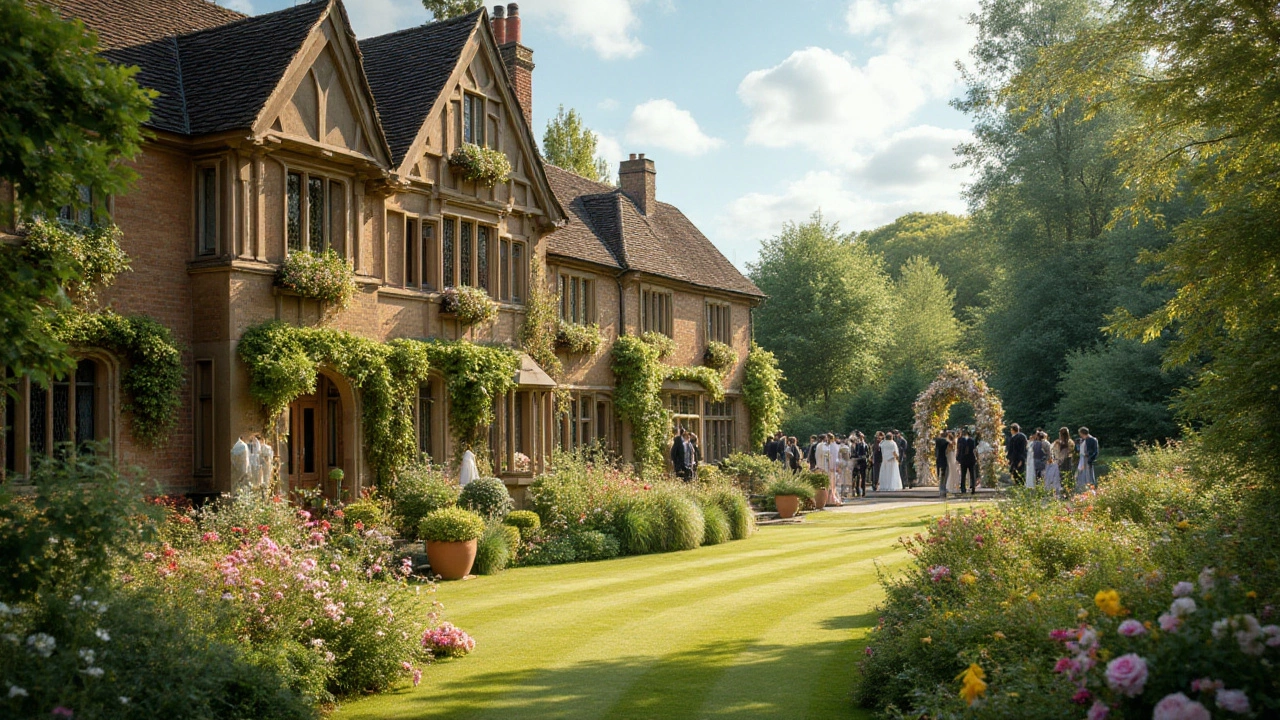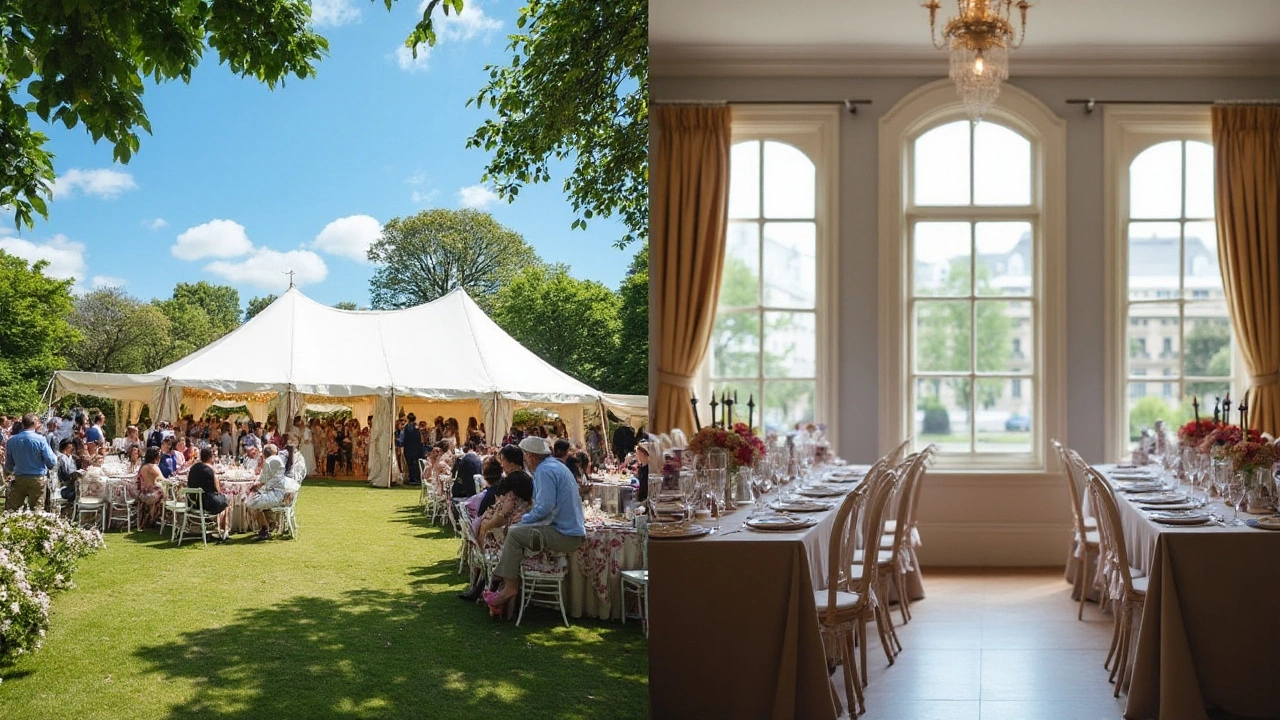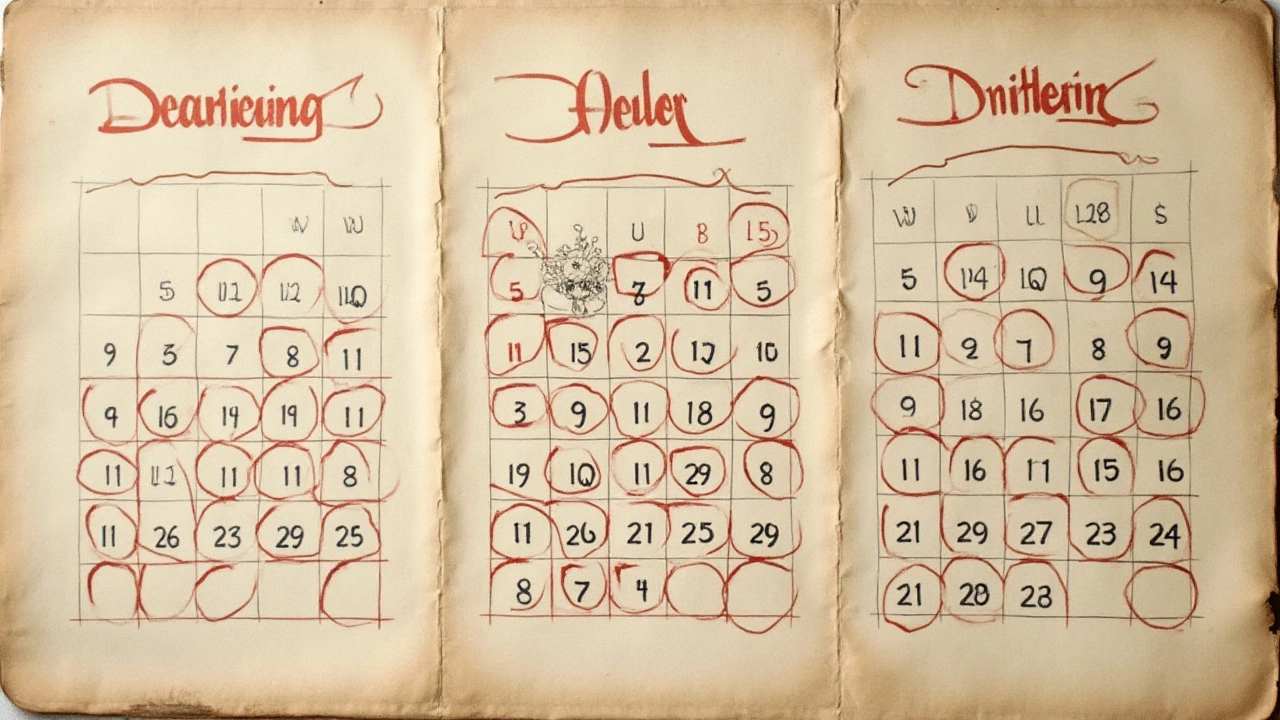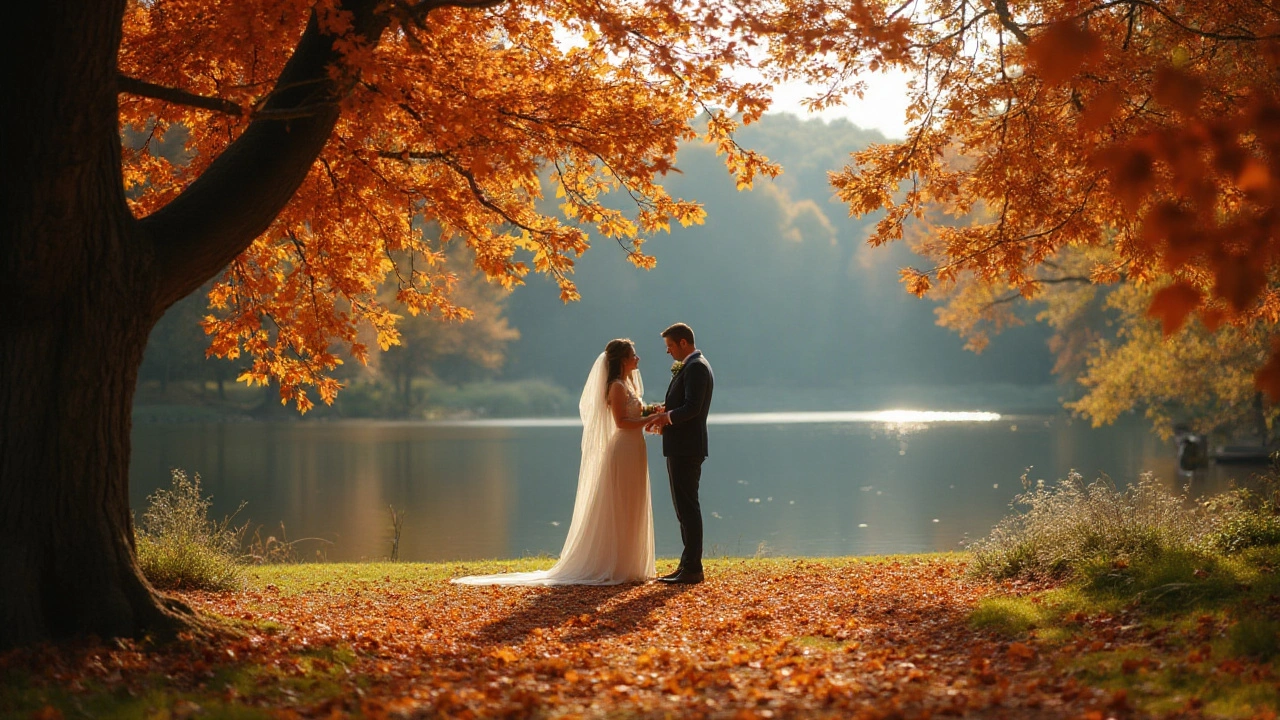Unveiling the Most Costly Wedding Days: A Guide to Luxurious Ceremonies
 Nov, 24 2024
Nov, 24 2024
Weddings are magical events, uniting two souls in a celebration of love, yet the timing of this special day can surprisingly dictate the size of the bill. Not all days are created equal in the wedding industry. The allure of a Saturday wedding in June might seem enchanting, but it often comes with a heftier price tag due to its desirability. Understanding these nuances can empower couples to make informed decisions without compromising their dreams.
The day you choose to get married can significantly sway your budget. Popular dates, often Saturdays and those that hold personal significance, see a spike in demand that caters to higher prices. Venues, photographers, and florists often have their hands full on these days, leading to inflated costs for your dream decor and arrangements.
Seasonality also plays a crucial role; the blooming optimism of spring or the summer’s vibrant energy invites flocks of couples to tie the knot, pressing vendors to raise their rates. But fear not, lovebirds! With a little creativity, choosing a Friday evening or a weekday can not only save costs but also provide a more intimate and unique experience for you and your guests.
- The Cost of Popular Wedding Dates
- Seasonal Influence on Wedding Prices
- Avoiding Peak Day Prices
- Creative Alternatives for Budget-Friendly Weddings
The Cost of Popular Wedding Dates
The timing of a wedding holds immense significance both for the couple and their guests, but it’s crucial to understand how the choice of date can heavily influence the budget. In particular, popular wedding dates often come with a higher price tag due to their high demand. Think about Saturdays in the summer or specific dates that have a special allure based on numerology or cultural traditions. It's these peak times that vendors capitalize on, as they realize that couples are willing to pay a premium for securing their dream day. Interestingly, certain holidays like Valentine's Day or New Year’s Eve are also high-demand dates, often coming with additional costs for the exquisite floral arrangements and bespoke event planning required to capture the festivity of the occasion.
Saturdays are the most coveted day of the week for weddings, with venues filling up as much as two years in advance in some locations. This has created a situation where prices can rise sharply. According to data from The Knot's Real Wedding Study, May and October are among the most popular months, hence the higher demand increases costs overall by around 20% compared to off-peak months like January or February. By understanding these trends, couples can make strategic decisions when booking vendors. Consider that by choosing a less traditional day such as a Friday or a Sunday, couples can often save significantly without sacrificing the experience. It's not only venues that are impacted; everything from caterers to photographers charges more during peak wedding season, magnifying the budget across all fronts.
"A wedding date is more than just a day on the calendar; it’s a decision that can impact every aspect of the planning process, from budget to vendor availability," remarks Jane Daniels, a renowned wedding planner with over a decade of experience navigating the intricacies of wedding logistics.
Advantages and Considerations
Understanding the reasons behind why expensive weddings fall on particular dates can guide couples in making informed choices. For those who dream of a lavish June wedding, embracing the challenge of competition means early planning and flexible expectations. It’s essential to weigh the sentimental value of the date against its financial implications. Some couples find that by being inventive with timing—such as hosting a brunch wedding versus a dinner reception—they can enjoy the same stunning elements at a fraction of the cost. Consider too, the convenience to your guests; while a Saturday might be ideal for travel and attendance, an unexpected Friday evening ceremony could bring unique charm and potential cost savings—often contributing to a more relaxed weekend for everyone involved.
Venues aside, ancillary costs can add up during peak times. The service fees, transportation logistics, and even accommodation prices for out-of-town guests can surge. Savvy wedding planners often recommend looking into special packages or promotions that venues might offer during slower periods, where savings can be as much as 30%. This optimization is particularly advantageous for couples willing to compromise on the conventional day of the week in favor of artistic vision and a broader budget for decoration and personalization.

Seasonal Influence on Wedding Prices
When planning a wedding, the time of year can heavily impact costs, often in ways that might surprise those new to event planning. Spring's popularity comes from the abundance of fresh blossoms, mild weather, and rejuvenating atmosphere, making it a favored choice for many couples. This surge in demand means venues, florists, and caterers might charge premium rates during this time, knowing the allure of a sun-drenched rose garden or a tulip-adorned aisle will push prices upward. The months of April to June often witness this pricing phenomenon.
Summer, known for its warm evenings and long daylight hours, follows closely behind, offering a perfect climate for outdoor ceremonies. The golden hues of sunset weddings are idyllic but they come at a cost, especially in sought-after destinations. While you might expect a summer wedding to flow with the charm of sunny bliss, one should brace for an uptick in vendor rates from July through September. With many guests able to travel during these months, the accommodation prices soar in tandem, making destinations like beaches and resorts prime yet costly venues.
The transition into autumn brings its own charm as the season paints landscapes with hues of gold and crimson. October brides and grooms frequently relish in the beauty of fall foliage, with rustic barns becoming iconic venues paired with warm, earthy designs. While it may offer breathtaking backdrops at a slightly reduced cost compared to summer, the period close to Thanksgiving can still be a peak time, nudging the price needle for venue and service providers.
Winter weddings, however, can be a double-edged sword. Though the sparkle of a winter wonderland might be tempting, elements like unpredictable weather or shortened daylight hours mean vendors can sometimes be less expensive, offering off-peak rates from January through March. Holiday-themed nuptials also tend to spike costs due to holiday surcharges, impacting everything from venue fees to travel and accommodation, especially around Christmas and New Year.
"Weddings follow seasonal patterns much like our wardrobes," shares a well-respected industry planner. "Often, taking the path less traveled seasonally can reward couples with both unique experiences and lighter price tags."

Avoiding Peak Day Prices
Navigating the landscape of wedding costs can be a dance between dreams and financial realities, but steering clear of peak day prices is a savvy strategy for those unafraid to color outside the traditional lines. Understanding the dynamics at play is crucial. The most expensive weddings typically fall during weekend summer days, primarily Saturdays. This is not just due to the popularity among couples but also because service providers anticipate high demand and adjust their rates accordingly, capitalizing on these busy periods.
One effective way to sidestep the costs associated with these peak days is to consider off-peak times. Weekday weddings are gaining traction as couples realize the benefits extend beyond just cost savings. Hosting your ceremony midweek or even on a Sunday can lead to dramatic reductions in venue hire and vendor fees. These savings might allow you to splurge on luxury wedding elements like that dream designer gown or a bespoke menu curated by top-tier chefs. A lesser-known fact is that some venues offer up to a 20% discount for midweek bookings, providing great value without compromising on the experience.
An often overlooked advantage of avoiding peak days is the availability and flexibility it affords. Venues that are typically booked out months, if not years, in advance on Saturdays are often more accessible on weekdays. This flexibility also extends to accommodations for guests, often an expensive part of wedding planning. Guests booking their travel and hotels for a weekday can benefit from off-peak prices, which helps ease the overall burden of organizing a large gathering. A strategic and creative approach to wedding planning can thus dramatically enhance your event’s offerings without blowing your budget.
"A wedding should be a celebration of intimacy and joy, not financial strain," says renowned wedding planner, Jenny Han.
"Weekdays can offer a serene and unique experience for couples who are willing to break tradition. We’ve seen countless ceremonies where the choice of date enhanced the personal touch of the event."This growing trend highlights a shift in how couples perceive their wedding planning, focusing more on personalization than tradition.
Moreover, the aesthetics of a weekday winery sunset or a mid-morning garden brunch create a rare charm, offering both unique photo opportunities and memories for a lifetime. Additionally, when considering wedding decorations, the theme and setting can be more memorable as guests aren’t divided among multiple weekend events. Thus, thinking creatively about when to hold your wedding not only broadens possibilities but also helps keep the financial aspect grounded.

Creative Alternatives for Budget-Friendly Weddings
Planning a wedding is often likened to solving a complex puzzle; the pieces must fit together seamlessly, from date selection to budget management. For many, the desire to host a lavish celebration often clashes with the constraints of finances. When it comes to reducing costs while still crafting a memorable event, a bit of creativity can go a long way. Choosing non-traditional wedding days is a start, but there are myriad imaginative ideas that can make a wedding both stunning and financially savvy. One tried-and-true method is to curate a list of wedding essentials and non-essentials, allowing couples to prioritize expenditures where they matter most, such as on photography or attire, while scaling back on other areas like floral arrangements or elaborate venues.
Embracing the beauty of nature by opting for an outdoor ceremony can dramatically cut costs associated with renting traditional venues. Public parks, botanical gardens, or even a friend’s backyard can serve as picturesque settings that require less decoration, thanks to their inherent charm. Another strategy is to tap into the power of community and skills exchange, where friends and family pitch in their talents—think homemade desserts, a DJ friend for entertainment, or a crafty cousin who loves DIY projects for wedding decorations. This sense of collaboration not only reduces expenses but also enriches the celebration with personal touches.
Alternative Venue Choices
Inevitably, wedding cost becomes a factor influenced heavily by the venue choice. In recent years, unconventional spaces such as art galleries, lofts, and even local libraries have opened their doors to matrimonious occasions, each offering distinctive backdrops that diverge from the norm. These venues often charge less, as they are not solely reliant on weddings to generate income. Utilizing off-peak hours, like brunch or late afternoon receptions, can also unlock discounts. To further illustrate the point, consider that booking a venue during the midweek can decrease rental fees significantly, making the dream of a luxury wedding more attainable without breaking the bank.
"Weddings can be expensive, but shifting the date and time can open doors to many unique venues that fit any budget," advises wedding expert Lisa Vorce in an article for Martha Stewart Weddings.
Experimenting with menu options is another avenue for savings. Opting for food trucks or buffets over multi-course sit-down dinners often results in an equally satisfying yet cost-effective dining experience. Seasonal and local produce not only support local businesses but also minimize transportation costs, allowing for fresh and diverse meal options. Couples might even consider crafting their bar menu around seasonal or local offerings, which can present both cost efficiency and a nod to sustainability.
Embracing Minimalism
Minimalism has emerged as a chic and budget-friendly trend in the wedding world. By focusing on simplicity, expenses often shrink and what's left is a serene and elegant ambiance. In practice, this might involve selecting a sleek wedding dress without elaborate embellishments, choosing monochrome or greenery-dominant decor which require few flowers, or even creating digital invitations to replace costly paper invites. Incorporating technology further by setting up a wedding website where guests can RSVP and find updates eliminates postal costs and enhances guest interaction.
From a broader perspective, the key to an affordable yet unforgettable wedding lies in innovation and thoughtful choices. Each decision, from an unexpected venue to minimalist decor, tells a story about the couple's unique journey. While grandiose elements are often coveted, embracing simplicity and resourcefulness can imbue the celebration with a character and warmth that feels authentically intimate and remarkably unique.